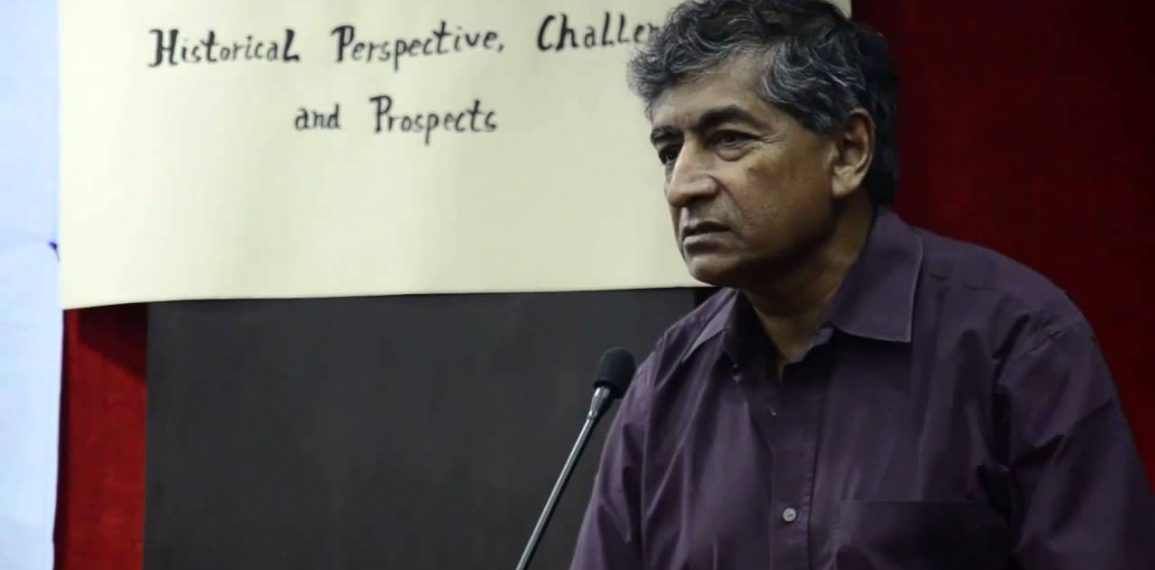AEPF, Democratisation and Human Rights Populist Authoritarianism and Alternative Arguments
 By Kamal Mitra Chenoy
By Kamal Mitra Chenoy
There is valid concern about the electoral victories of right wing populists (RWP), and the rise of authoritarian nationalism across many countries and societies. The moves by the far right for hegemony by changing discourse and changing citizenship laws needs to be challenged through the force of ideas and popular movements.
The current conjuncture of unbridled neo liberalism has resulted in social, economic, political crises. Such crises and rising aspirations causes anxieties amongst the popular masses. The RWP use these insecurities to blame and challenge minority communities, migrants, established institutions, create counter narratives, and mobilize forces to gain power. RWPs blame the crises on the liberals, universal rights, migrants, on ‘others’, corruption of past leaders, labour rights, etc. Identity assertion and especially Islamphobia, is often at the core of this mobilization. However, RWP continue with neo liberal policies, with limited changes that were the real reason for the crises in the first place.
How can progressive movements challenge the rise of populist authoritarianisms?
Showing the economic irrational policies and politics of RWP
The reality is that neo-liberal policies of privatization and globalization, unfettered free trade, the increased corporate control over and above state policies have led to increasing inequality, precarious livelihoods, decrease of public funding on social sector, unemployment and social pressures. The distress promoted the political rise of the far right. RWP promise a future constructed on a ‘pure’ imagined past and identity nationalism as the cure. The RWP narrative is that subsidies to the poor, especially migrants (who are generally citizens), affirmative action for the marginalised, people of colour; (US, EU), Islamic people (India, US, EU et al) entry of women into job markets, are a drain on the national economy, and threaten national culture, during which the national (‘pure’ ‘nativist’ ‘victimized majority’) community suffers economically and their ‘traditional’ values (religious, family, mythical, etc) are under threat. They also blame liberals and the Left and call for supremacy of a unified, nativist majority mass.
RWP reject liberal rights as well as workers’ rights. They re-assert neoliberal policies, within an ultra nationalist framework. For example, the instrument of placing ‘tariffs’ (by President Trump) as an instrument of foreign economic policy, does not ensuring fair trade or workers’ rights, but appeals to nationalist emotions by only asserting barriers and raising costs. RWP seek to replace class inequality with identity based inequality, by putting in place policies that favour one community, or promoting particular oligarchs (As Putin has often done). So displacing minorities/ migrants/ others/ women and marginalizing them.
Authoritarian nationalism has to be challenged by a democratic and plural nationalism. By showing the impact of corporate control, challenging binding trade treaties, showing the value and inter-linkage of social justice, climate justice, rights and saving livlihoods de-militarization. It is evident that “Democracy in danger of becoming a shell in itself, if the present trend on concentration of wealth continues.” (Kurz Heinz, 2018)
Countering the RWP project of Hegemony
RWP super imposes itself on any form of political system, but is especially effective with the new and transitional democracies (Central-East Europe, South East and South Asia, Latin America). Once in power, RWP re-shape institutions and change laws to change the nature of citizenship and management and the state. RWP combine the method of electoral democracy with authoritarian control, shrinking participatory democracy in order to re-order the mass. Therefore the challenge to RWP is through counter ideas, evidence based arguments that show up the real nature and falsehoods of the RWP project.
The RWP agenda of changing state character is through the capture of institutions, changing privileges and laws of citizenship by marking insiders and outsiders. Several RWP leaders from Presidents Trump, Putin, Erdogan, Duterte, Hungarian President Victor Oban, Brazil’s Bolsonaro, Modi and others work to restructure the balance of power (the centre piece of democratic constitutions), potential sources of power and attack the idea of empowerment. Starting with complete control of their own parties, marginalizing their own cabinets, moving to control over the judiciary and changing the federal structure. In all states where RWP rule, there has been a serious decline of autonomous institutions and general decline in public expenditure. Of course the slide of the scale varies. This capture of institutions has to be resisted by popular movements, from municipality upwards.
RWP seek to fuse exclusive identity assertions. The nation is identified with a dominant, singular and homogenized community, based on religious or ethnic roots. (‘Islamic State’, ‘Hindu Rashtra’ Christian or Nativist etc). Those ‘outside’ are politically, culturally marginalized, with policies and laws. Economic degradation follows. These changes are legitimized by ultra-nationalism.
RWP gain legitimacy through politicized religion, the mythical past, rather than the plurality and complexity of history and reality. They use emotional arguments (‘motherland’, martyrdom and historical victimhood, etc.) For example Trump called the migrant caravan (Hispanics) of 4000 an “invasion”. So developing fear psychosis. Populism like other ideologies, makes claims in the name of the people, but the far right’s concept of peoples and policies are generally exclusive to one dominant identity opposed to several others.
In the RWP project, ‘outsiders’ are rejected and mocked. This process de-humanises the different and makes them vulnerable to discrimination and vigilante violence. (Jaraslaw Kaczynski of Poland’s governing PIS described migrants as carrying “various parasites and protozoa, which don’t affect their organisms, but which could be different here.” India’s Home Minister Amit Shah described Muslim migrants to Assam as ‘termites’). Millions of people from the state of Assam have been made non citizens, through a national citizens register. The Muslim dominated state of Jammu and Kashmir has been dissolved from statehood.
The idea of nation with singular and forced identity have been long challenged historically, theoretically and in practice. History has repeatedly shown the high cost of right wing militarist regimes. Many states have active and frozen conflicts and civil wars on account of suppressing minorities groups from equal citizenship (Sri Lanka, Myanmar). These facts and experiences need to be re-asserted and shown in new popular ways.
The Rise of RWP signifies a backlash against feminism and gender choices, as they focus on ‘set’ family values, stereo typed binary roles for women and express homophobia. Duarte for instance joked about raping Ms.Universe, and equated having a second wife to keeping a “spare tire” in the trunk of a car. (Time, July 23, 2018.) Feminists argue that RWP’s posses ‘toxic masculinity’ and they stereotype binary gender roles, even as these have been long rejected by the women’s movement. They reduce women as a resource for national development. At the same time, RWP tolerate women who belong to their own identity and ideology, but cannot tolerate migrants, and the other. Women have also backed RWPs from Duterte, Bolsonaro, Trump, on account of different reasons, But women’s movements have also strongly opposed RWP and are major allies in the resistance.
RWP infuse militarism into civilian life. Populists project revivalism as their cadre infuse militarist values into civilian life. Jair Bolsonaro, Brazil, former army captain, appreciates the hated dictatorship of Pinochet, champions unrestricted sales of firearms, argues that police encounter killing is self defence. The peace movement and information about the rise of military spending has to be popularized to challenge this militarism.
Resistance
Peoples and grass roots democracy supported by a collective of minorities are a major force fighting right wing authoritarianism and populism. Liberals and Left are important part of the resistance, even as the Left has declined in many countries. Further a major challenge is the condition of enforced silence. Even while liberals support neo-liberal policies and do not see the connect of neo-liberalism and the extreme right, yet they are defending democratic rights in a major way. But the real force that can defeat RWP will be people and alternate ideas. These ideas, practices exist and have defeated right wing authoritarianism earlier. We have to find ways to connect progressive ideas to the mass of people.
Resistance to RWP depends on the depth of democratic culture and rainbow coalitions in each country. This requires intervention in institutions, in constitutional structures, in political parties, social movements and on the streets. This has to be linked to material conditions, popular livelihoods, popular rights and freedoms, based on peoples security and freedoms from want, fear and violence.
References
Cohen, Roger (2018) How democracy became the enemy, New York Times, April 7-8 2018.p.9.
Heinz, Kurz (2018) ‘Power, the bete Noir of Modern Economics, Ideas Working Paper, 01/2018 at http://www.networkideas.org/wp-content/uploads/2018/04/01_2018.pdf



